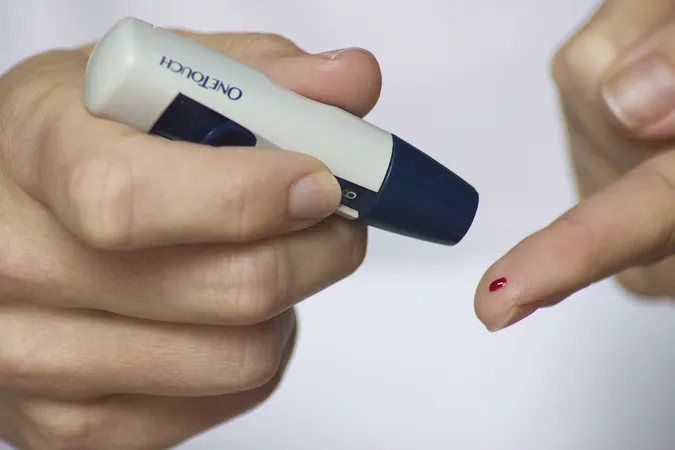
Shocking Link Revealed: Early Type 2 Diabetes Diagnosis Dramatically Increases Dementia Risk!
2024-11-19
Author: Jacques
A groundbreaking study from NYU Rory Meyers College of Nursing has unveiled a startling connection: individuals diagnosed with type 2 diabetes at a younger age face a significantly higher risk of developing dementia compared to those diagnosed later in life. The research, featured in the journal PLOS ONE, emphasizes the alarming extent of this risk, particularly among adults with obesity.
"These findings highlight the cognitive consequences that may arise from an earlier diagnosis of type 2 diabetes. It is crucial to develop preventive strategies that address both diabetes and obesity," stated Xiang Qi, the assistant professor and lead author of the study.
Diabetes, particularly type 2, is already identified as a contributing factor to dementia. Although scientists are still unraveling the intricate biological pathways, elevated blood sugar, insulin resistance, and chronic inflammation associated with diabetes are believed to exacerbate cognitive decline.
Once considered a disease primarily affecting older adults, type 2 diabetes is now increasingly diagnosed in younger populations. Alarmingly, it's reported that one in five individuals with type 2 diabetes worldwide is under the age of 40.
To explore the relationship between the age at diagnosis of type 2 diabetes and subsequent dementia risk, the research team analyzed extensive data from the Health and Retirement Study between 2002 and 2016. This longitudinal study, managed by the University of Michigan Institute for Social Research, provided insights into the long-term consequences of diabetes on cognitive health.
The study included 1,213 U.S. adults aged 50 and older, all of whom had their type 2 diabetes confirmed through blood tests and showed no signs of dementia when they joined the study. Over a follow-up period of up to 14 years, it was found that 216 participants (approximately 17.8%) eventually developed dementia.
The analysis revealed a concerning pattern: adults diagnosed with type 2 diabetes at a younger age faced a heightened risk of dementia. Those diagnosed before age 50 had a 1.9-fold increased risk compared to those diagnosed at 70 or older. Similarly, individuals diagnosed between the ages of 50 and 59 were 1.72 times more likely to develop dementia, and those diagnosed between 60 and 69 had a 1.7 times higher risk.
Further statistical evaluations indicated a direct correlation; for every year younger a person is at the time of their diagnosis, their risk of dementia rises by 1.9%.
"The reasons behind this increased risk remain uncertain," noted Bei Wu, the Dean's Professor in Global Health and the study's senior author. She pointed out that previous research indicates people diagnosed with midlife type 2 diabetes often experience heightened vascular complications, poorly managed blood sugar levels, and insulin resistance, all of which are well-known risk factors for cognitive impairment.
Interestingly, the impact of obesity in conjunction with early diabetes diagnosis cannot be overlooked. The study found that those with obesity diagnosed with type 2 diabetes before age 50 showed the most pronounced risk of developing dementia.
As understanding deepens regarding the interplay between the timing of diabetes onset, obesity, and dementia risk, there is hope that these findings will guide the development of targeted interventions aimed at preventing dementia—an essential step in improving cognitive health for future generations.









 Brasil (PT)
Brasil (PT)
 Canada (EN)
Canada (EN)
 Chile (ES)
Chile (ES)
 España (ES)
España (ES)
 France (FR)
France (FR)
 Hong Kong (EN)
Hong Kong (EN)
 Italia (IT)
Italia (IT)
 日本 (JA)
日本 (JA)
 Magyarország (HU)
Magyarország (HU)
 Norge (NO)
Norge (NO)
 Polska (PL)
Polska (PL)
 Schweiz (DE)
Schweiz (DE)
 Singapore (EN)
Singapore (EN)
 Sverige (SV)
Sverige (SV)
 Suomi (FI)
Suomi (FI)
 Türkiye (TR)
Türkiye (TR)